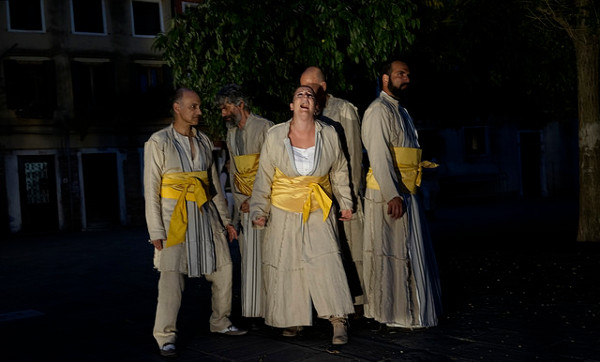Research
Publications catalogue
The publications catalogue of the Department collects the information from ARCA [ITA], the institutional open-access archive of Ca’ Foscari scientific production.
It is also accessible from cerCa, the Ca’ Foscari bibliographic platform.

Department of excellence
Scientific research has a relevant and tangible impact on society, fostering knowledge, development, and innovation. Find out more about our Department's activities, projects, and achievements.
Working in research
PhD Degree is the highest level of academic education. It is a limited admission degree programme and lasts for at least three years. It allows graduates to develop methods and skills to pursue highly qualified research.
Short-term research fellowships allow Master’s Degree graduates to pursue short-term research (less than 12 months normally) including them in existing projects and research groups.
Research grants allow Master’s Degree graduates and PhDs to pursue research activities at the university or in the projects offered to the candidates.
In this section also a list of the ongoing research grants and topics [ITA], including the area research fellowships and the research fellowships on specific projects.
Discover all the other opportunities of international recruitment at Ca’ Foscari: our University is highly committed in achieving excellence in research, developing international partnerships and funding new talents.
Research areas
The DSLCC is a national centre of excellence for its diverse offer of European and American languages, literature and culture which contributed to Ca' Foscari ranking among the 150th top universities for Modern Languages around the world and fifth in Italy.
Research covers three main areas: Culture and literature; Linguistic, philology, glottodidactics; History and international politics.
Research projects

Shakespeare in and beyond the ghetto
Coordinator: Shaul Bassi, Duration: June 2016-2018, Cost: €350,000
(Creative Europe - Culture Sub-programme 2014-2020)
For the 500th anniversary of the Jewish Ghetto of Venice (1516-2016), the neighborhood which provided the world with the word 'ghetto', and for the 400th anniversary of William Shakespeare's death, the project emerges from the first ever production of The Merchant of Venice in the Ghetto, the backdrop to the play.
The Ghetto and the play, with its main character Shylock, are key documents in European history, to be used against discrimination and as tools for tolerance. The production and its Summer school, three symposia, ten artistic workshops and many online activities involving four European countries (Italy, Great Britain, Germany, Romania) will show the relevance of Shakespeare’s controversial play and its ability to evoke current issues with several artistic expressions.

SIGN-HUB - The Sign Hub: preserving, researching and fostering the heritage of Deaf communities
Coordinator: Chiara Branchini, Duration: April 2016-2020, Cost: €170,583.00 (H2020-REFLECTIVE-2-2015)
SIGN-HUB is a four years research project funded by the European Commission as part of Horizon 2020 Reflective Society 2015, involving seven countries (Spain, France, Germany, the Netherlands, Italy, Turkey, Israel) aiming at creating an inclusive historic documentation, linguistic and cultural research resource for deaf communities and evaluating sign language in the medical and educational fields. In order to reach such goals, the project will create a digital platform with accessible interfaces where the following research results will be shared:
- digital grammars of the national sign languages of the participating countries;
- an online atlas of the sign languages spoken around the world;
- evaluation tools for sign languages in the medical and educational fields;
- the first online life stories archive of mature signers.

Deaf learning, Erasmus +
The implementation of teaching programmes, e-handbooks and e-learning courses to improve the reception and written skills of deaf persons in their national languages.
Coordinator: Anna Cardinaletti, Researcher: Laura Vopato, Duration: 36 months (deadline 31/08/2018), Cost: € 333.962,00 total - € 76.675,00 Italy (Erasmus +, European Commission)
The Erasmus+ Deaf Learning project aims at creating 5 training programmes with frontal courses and autonomous learning (e-handbook, e-learning) in national sign languages to deaf students between 16 and 25 years old. The five countries involved (Austria, Great Britain, Italy, Lithuania and Poland) have got researchers and teachers specialized in teaching deaf students. The courses - one per involved national languages - will follow 4 levels as the QCER (A1, A2, B1 e B2) and will keep into consideration the specific needs of their audience.

Study Abroad Research in European Perspective (SAREP)
Coordinator: Giulia Bencini, Duration: September 2016-2020, Cost: COST Action CA15130
In the context of increasing international education and study abroad at both European and international level, this project aims to explore the nature, experiences, benefits and limitations of study and residence abroad in the case of second language learners who participate in growing numbers in such international exchange programmes. We do so through a multi-thematic prism, drawing on research relating to the learner's linguistic, intercultural, social, personal, academic and professional development, reflecting the folk-belief in the wide-ranging benefits that can accrue to the learner in a study abroad context. e. The project offers different insights into the complexity of study abroad as a context of second language learning through both quantitative and qualitative analysis, drawing on wide-ranging methodological approaches and tools of investigation. At a time when increased importance is attached to foreign language learning at European level, the project illuminates wide-ranging factors which may impact on study abroad as a context which can facilitate such an aim to varying degrees. Project site


